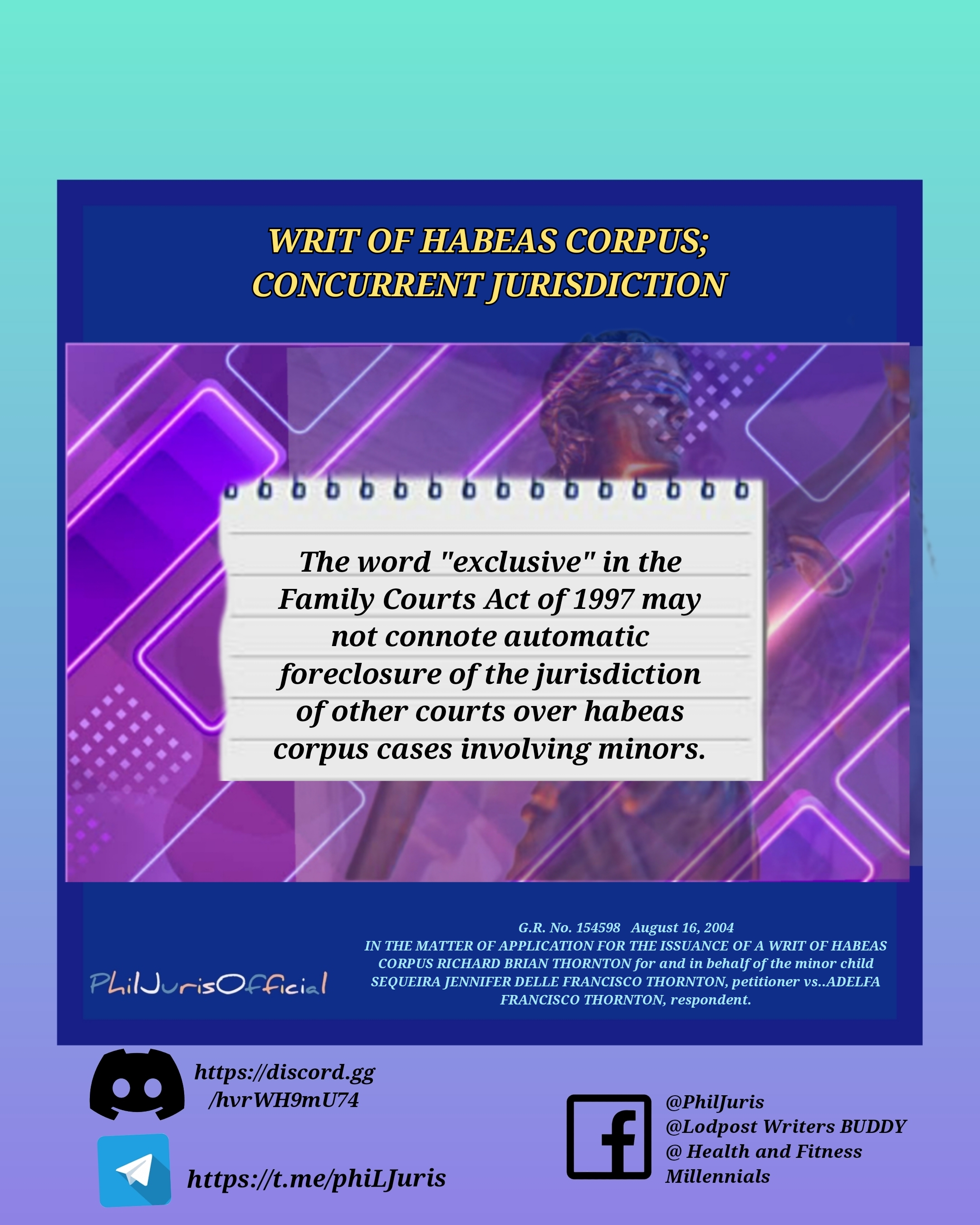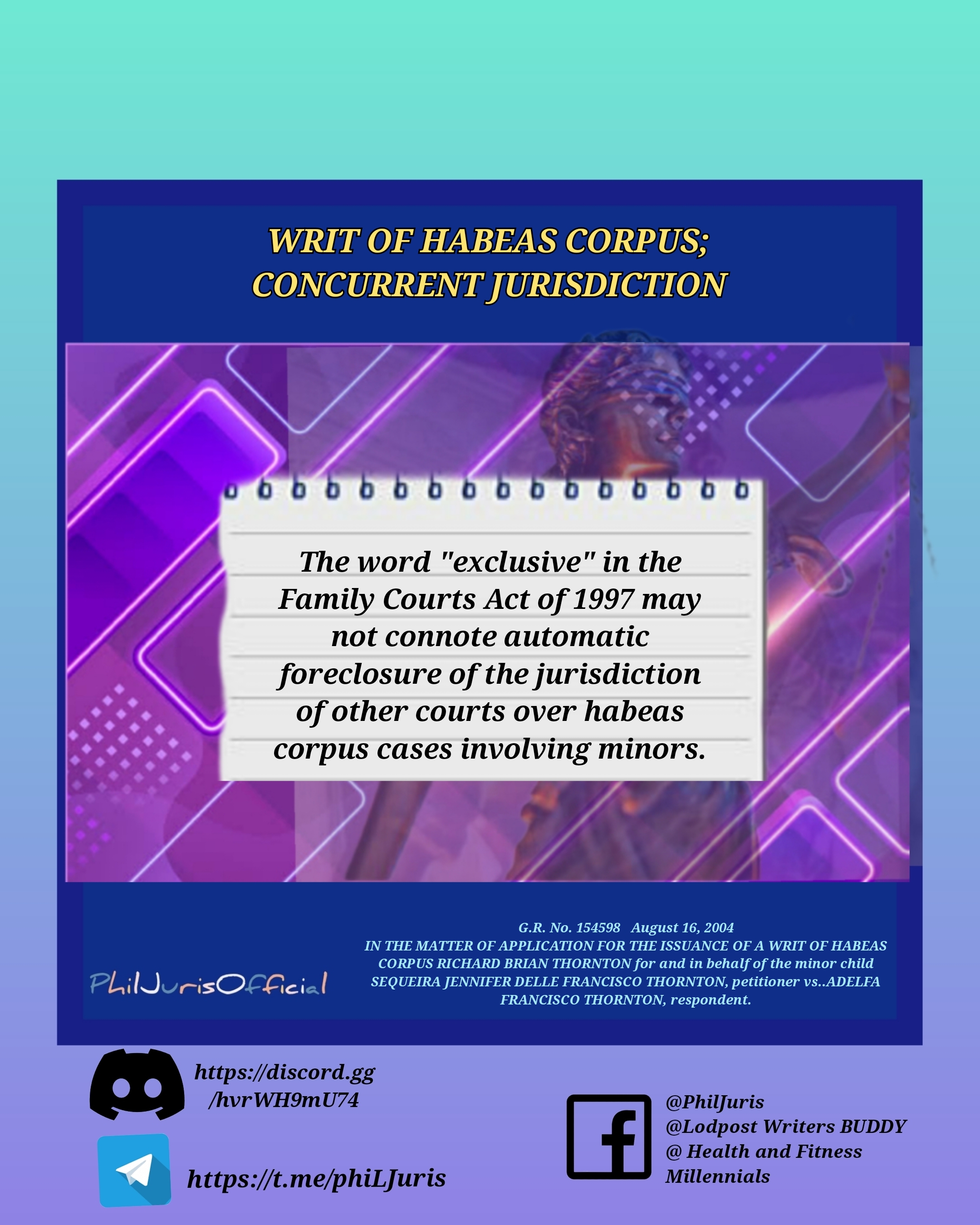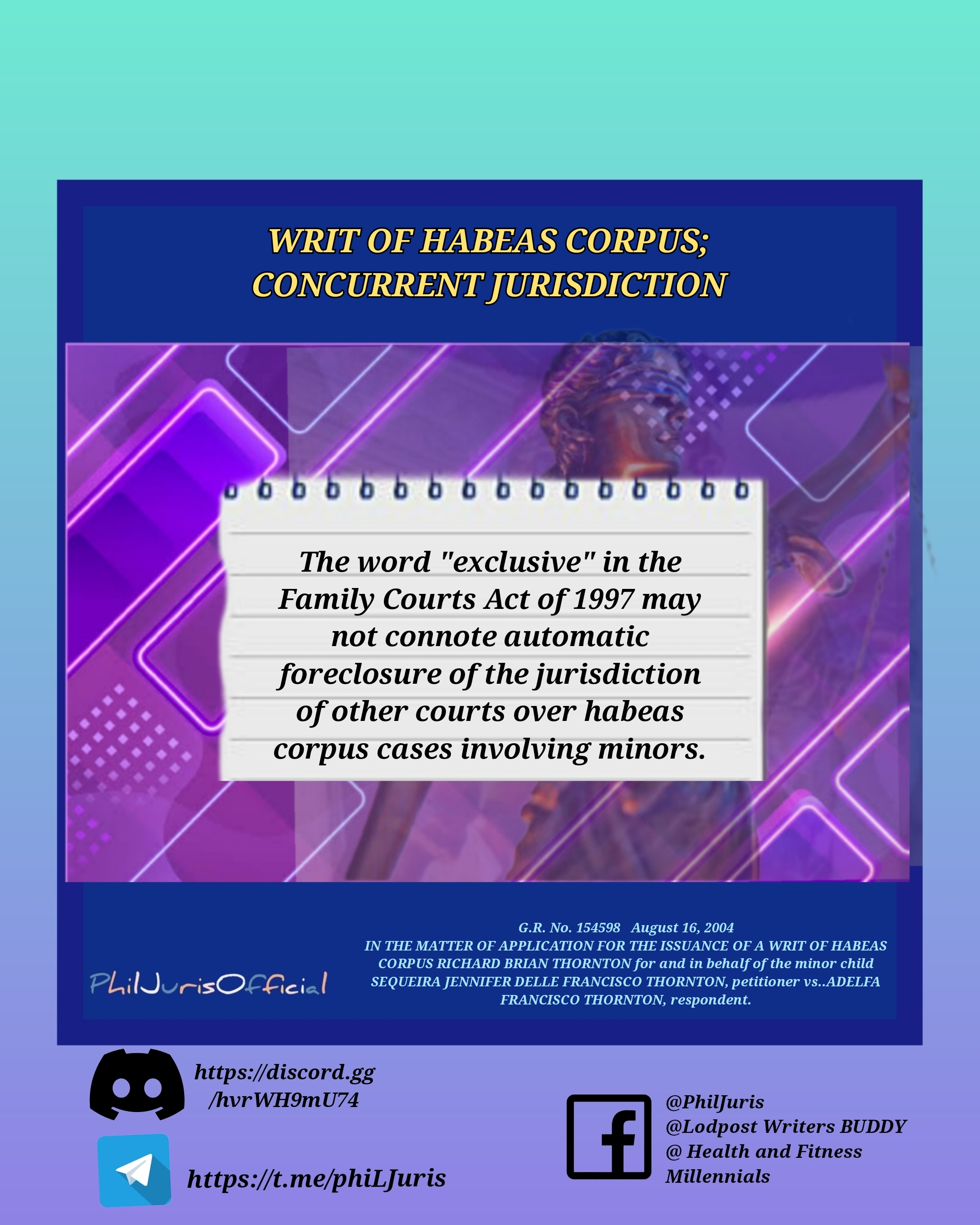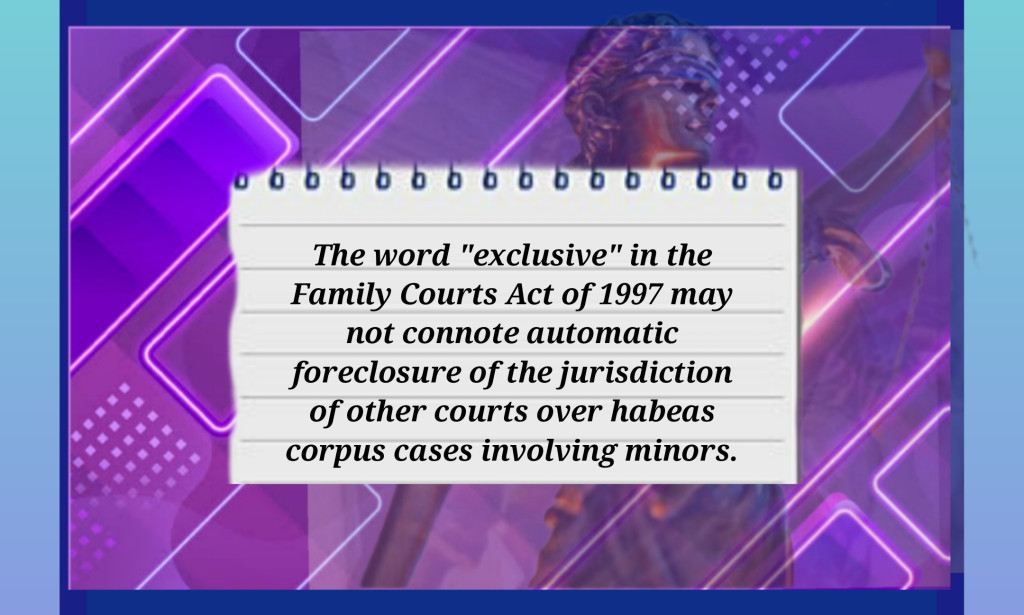WRIT OF HABEAS CORPUS; CONCURRENT JURISDICTION.

The word "exclusive" in the Family Courts Act of 1997 may not connote automatic foreclosure of the jurisdiction of other courts over habeas corpus cases involving minors.
The facts.
The respondent was Filipino, while the petitioner was American. They had a daughter and were married. After three years of being a bland housewife, the woman was tired of it and wanted to return to her old job as a GRO in a nightclub. The woman and her daughter left their home one day and told their servants that they were going to Basilan. The husband asked the Family Court in Makati City for a habeas corpus, but it was turned down because the child was in Basilan. When he went to Basilan to find them, he couldn't find them, and the barangay office confirmed that the respondent no longer lived there. The petitioner filed another habeas corpus petition in California, which has the power to issue a writ of habeas corpus that can be used anywhere in the country. The CA denied the petition because it did not have jurisdiction to hear the case. The Court of Appeals opines that RA 8369 impliedly repealed RA 7902 and BP 129 since, by giving family courts exclusive jurisdiction over habeas corpus cases, the lawmakers intended it to be the sole court which can issue writs of habeas corpus.
Q: Resolved whether the Court of Appeals has the authority to issue writs of habeas corpus in custody cases involving minors, although RA 8369 states that only family courts are authorized to hear such petitions.

Our recommended books in Civil Law:
Persons and Family Relation
Paras Book III
https://c.lazada.com.ph/t/c.YpmrcQ
Civil Law Review by Jurado.
https://c.lazada.com.ph/t/c.YpmsmJ
Civil law Codal.
https://c.lazada.com.ph/t/c.YpKXTw
Bar Questions and Answers; UP Law Complex. Civil Law.
https://c.lazada.com.ph/t/c.YpmsNF
Civil Law - Vivian Paguirigan - Central - Questions and Answers (Central bookstore).
https://c.lazada.com.ph/t/c.YpKXTz
Product Name: Questions & Answers of 2005-2021 Supreme Court Decisions in Civil Law (2022 Edition)
https://c.lazada.com.ph/t/c.YpKX64
Recommended books in Remedial law:
Bar Questions and Answers; UP Law Complex. Remedial Law.
https://c.lazada.com.ph/t/c.YpmKL2
Civil Procedure (The Bar Lectures Series) VOL. I. (2022 Ed.) Rules 1-56 by Dean Willard (+)
https://c.lazada.com.ph/t/c.YpQyeT
Civil Procedure (The Bar Lecturer Series) VOL. II. (2022 Ed.) by Dean Willard (+)
https://c.lazada.com.ph/t/c.YpQzqD
EVIDENCE (2022 Ed.) by Dean Willard (+)
https://c.lazada.com.ph/t/c.Yp9Zb8
Rules of Court
https://c.lazada.com.ph/t/c.YpmsNm
Questions & Answers of 2005-2021 Supreme Court Decisions in Remedial Law (2022 edition)
https://c.lazada.com.ph/t/c.YpK0EN
Bar Q&A (2022 Ed.) - Remedial Law - Riguera - Central - Questions and Answers
https://c.lazada.com.ph/t/c.YpK0Ep
Continue reading...
Ruling:
In this case, the Court of Appeals opines that RA 8369 impliedly repealed RA 7902 and BP 129 since, by giving family courts exclusive jurisdiction over habeas corpus cases, the lawmakers intended it to be the sole court which can issue writs of habeas corpus. To the court a quo, the word "exclusive" apparently cannot be construed any other way.
We disagree with the CA’s reasoning because it will result in an iniquitous situation, leaving individuals like petitioner without legal recourse in obtaining custody of their children. Individuals who do not know the whereabouts of minors they are looking for would be helpless since they cannot seek redress from family courts whose writs are enforceable only in their respective territorial jurisdictions. Thus, if a minor is being transferred from one place to another, which seems to be the case here, the petitioner in a habeas corpus case [will be left without legal remedy]. This lack of recourse could [not] have been the [intention] of the lawmakers when they passed the Family Courts Act of 1997. (Emphasis supplied).
The primordial consideration is the welfare and best interests of the child. We rule therefore that [RA 8369 did not divest] the Court of Appeals and the Supreme Court of their jurisdiction over habeas corpus cases involving the custody of minors. Again, to quote the Solicitor General:
“To allow the Court of Appeals to exercise jurisdiction over the petition for habeas corpus involving a minor child whose whereabouts are uncertain and transient will not result in one of the situations that the legislature seeks to avoid. First, the welfare of the child is paramount. Second, the ex parte nature of habeas corpus proceedings will not result in disruption of the child’s privacy and emotional well-being; whereas to deprive the appellate court of jurisdiction will result in the evil sought to be avoided by the legislature: the child’s welfare and well being will be prejudiced” [.]
The word "exclusive" in the Family Courts Act of 1997 may not connote automatic foreclosure of the jurisdiction of other courts over habeas corpus cases involving minors.
The jurisdiction of the Court of Appeals and Family Court in the case at bar is concurrent.
The [Family Court] can issue writs of habeas corpus enforceable only [within its territorial jurisdiction]. On the other hand, in cases where the territorial jurisdiction for the enforcement of the writ [cannot be determined] with certainty, the Court of Appeals can issue the same writ [enforceable throughout the Philippines], as provided in Sec. 2, Rule 102 of the Revised Rules of Court. (Emphasis supplied).
In the case at bar, a literal interpretation of the word "exclusive" will result in grave injustice and negate the policy "to protect the rights and promote the welfare of children"under the Constitution and the United Nations Convention on the Rights of the Child. This mandate must prevail over legal technicalities and serve as the guiding principle in construing the provisions of RA 8369.
The provisions of RA 8369 reveal no manifest intent to revoke the jurisdiction of the Court of Appeals and Supreme Court to issue writs of habeas corpus relating to the custody of minors. Further, it cannot be said that the provisions of RA 8369, RA 7092 and BP 129 are absolutely incompatible since RA 8369 does not prohibit the Court of Appeals and the Supreme Court from issuing writs of habeas corpus in cases involving the custody of minors. Thus, the provisions of RA 8369 must be read in harmony with RA 7029 and BP 129 ― that family courts have concurrent jurisdiction with the Court of Appeals and the Supreme Court in petitions for habeas corpus where the custody of minors is at issue.
In any case, whatever uncertainty there was has been settled with the adoption of A.M. No. 03-03-04-SC Re: Rule on Custody of Minors and Writ of Habeas Corpus in Relation to Custody of Minors. Section 20 of the rule provides that:
“Section 20. Petition for writ of habeas corpus.- A verified petition for a writ of habeas corpus involving custody of minors shall be filed with the Family Court. The writ shall be enforceable within its judicial region to which the Family Court belongs.
xxx xxx xxx
The petition may likewise be filed with the Supreme Court, Court of Appeals, or with any of its members and, if so granted, the writ shall be enforceable anywhere in the Philippines. The writ may be made returnable to a Family Court or to any regular court within the region where the petitioner resides or where the minor may be found for hearing and decision on the merits.” (End of emphasis).

From the foregoing, there is no doubt that the Court of Appeals and Supreme Court have concurrent jurisdiction with family courts in habeas corpus cases where the custody of minors is involved.
One final note. Requiring the serving officer to search for the child all over the country is not an unreasonable availment of a remedy which the Court of Appeals cited as a ground for dismissing the petition.
G.R. No. 154598 August 16, 2004
IN THE MATTER OF APPLICATION FOR THE ISSUANCE OF A WRIT OF HABEAS CORPUS RICHARD BRIAN THORNTON for and in behalf of the minor child SEQUEIRA JENNIFER DELLE FRANCISCO THORNTON, petitioner vs..ADELFA FRANCISCO THORNTON, respondent.
To read more about Philippine laws and jurisprudence, visit our LINK-IN-BIO



You must be logged in to post a comment.